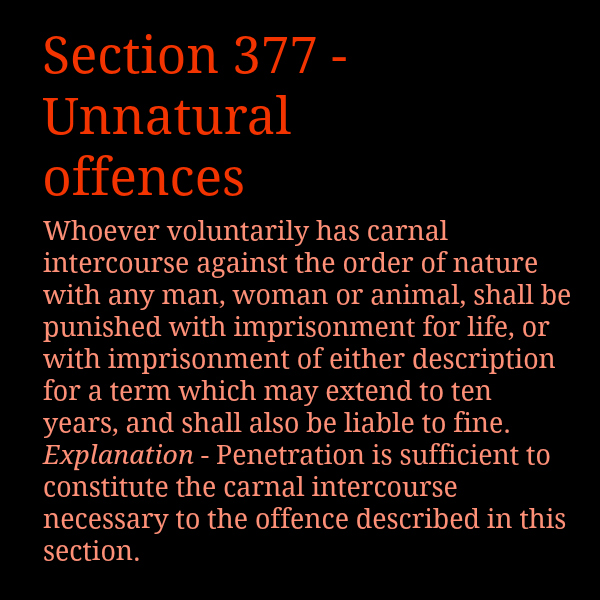Delhi High Court’s ‘decriminalizing’ homosexuality has been an interesting event because the ‘relief’ that High Court granted does not really enable two consenting adults to do behind the closed doors anything that they could not do earlier.
No person can be prosecuted without evidence and to gather evidence to support a charge of unnatural sex between two consenting adults, the authorities would necessarily have to breach right to privacy in one way or the other, which is impermissible in law, as right to privacy is a fundamental right. Therefore, it is virtually impossible to invoke Section 377 against homosexuals. This explains why there has been no prosecution of consenting homosexuals under the said provision.
Possible or actual misuse of a legal provision or an apprehension of the provision’s violating a fundamental right are no grounds for the court to declare the impugned provision unconstitutional. It is upon those who assail a legal provision on constitutional grounds to show an instance of the actual violation of a fundamental right. The court is a place where legal provisions are enforced and in case of violation of any right, relief is granted. It is no place to hold an academic debate about the desirability or dangers of legal provisions. Since the petitioners did not have a single instance of the prosecution of a person for consensual homosexual act, the High Court could not have entertained the petition in the first place.
Furthermore, in this case the provision had stood since 1860 and in over 60 years, Parliament did not find it fit to interfere with it. Therefore, there has to be a very strong presumption in favour of its constitutional validity.
 It was also argued that the term ‘sex’ used under Article 15 should be read to include ‘sexual orientation’ thus extending the protection of Article 15 to the homosexuals against Section 377. The term ‘sex’ under Article 15 refers to a status and not an act, and so does the expression ‘sexual orientation’. Section 377 does not punish one for one’s sexual orientation.
It was also argued that the term ‘sex’ used under Article 15 should be read to include ‘sexual orientation’ thus extending the protection of Article 15 to the homosexuals against Section 377. The term ‘sex’ under Article 15 refers to a status and not an act, and so does the expression ‘sexual orientation’. Section 377 does not punish one for one’s sexual orientation.
Therefore, the police cannot haul someone for ‘being’ homosexual, but only for specific acts of unnatural sex. Even if the person shows up in a police station and declares that he is ‘gay’, the state still cannot prosecute the person in absence of evidence to support at least one act of ‘unnatural sex’. The same goes even for a murderer. It is not enough for one to confess to having killed. If the police fail to ascertain who has been killed, even a confession before a magistrate would not get them a conviction. That’s because it is the act of killing, and not one’s status as a murderer, that makes one liable for punishment. This might appear to be a very fine distinction, but it is this distinction that disallows the state from prosecuting one for simply ‘being’ gay. The protection of Article 15, even if ‘sexual orientation’ is included within the meaning of ‘sex’, does not extend to Section 377 simply because it would be illogical and absurd to say that Article 15 prohibits the State from doing under Section 377 what it was never doing and could not have done anyway, which is to punish someone for his or her sexual orientation. This is an inherent limitation in Section 377 with respect to its enforceability against the homosexuals. The ‘reading down’ was not required, at least not as urgently.
The “persons who demonstrate a propensity or intent to engage in homosexual acts” are prohibited from serving in the armed forces of the United States. It is this kind of discrimination that could attract the protection of Article 15 because this is a discrimination based on ‘sexual orientation’, which is why if one proclaims to be a homosexual while serving in the US armed forces, he or she would be discharged without the authorities having to show that he or she actually engaged in homosexual act. And that is demonstrably not the case with Section 377.
 The manner in which Section 377 has been selectively struck down is also questionable. Doctrine of severability provides that a part of the legal provision may be struck down for being ultra virus the Constitution if it is severable from the rest, and if not, the whole of the provision must go. It is only in exceptional cases that on account of the inseverability of the part, its enforcement is restricted on constitutional grounds.
The manner in which Section 377 has been selectively struck down is also questionable. Doctrine of severability provides that a part of the legal provision may be struck down for being ultra virus the Constitution if it is severable from the rest, and if not, the whole of the provision must go. It is only in exceptional cases that on account of the inseverability of the part, its enforcement is restricted on constitutional grounds.
Exercise of Judicial Review to restrict enforcement of a provision can only be done in situations wherein both striking down the impugned provision and enforcing it in totality result in ‘actual’ violation of a fundamental right. Such exercise of Judicial Review must be strictly and clearly in the interest of justice, as it strains the Separation of Powers inbuilt in our Constitution because ‘reading down’ a provision means virtually rewriting it, which lies in the exclusive domain of the legislature. Separation of Powers is part of the Basic Structure of the Constitution, which no arm of the state, including the Judiciary, can offend.
Therefore, such exercise of Judicial Review that treads the borderline of the Separation of Powers must be occasioned by urgent and compelling need. Section 377, having stood for nearly a century and a half without a single homosexual prosecuted under the provision in at least the last 60 years, certainly did not warrant the exercise of Judicial Review in its extraordinary mode.
Therefore, it appears that the High Court exercised the power of Judicial Review improperly in an inappropriate case, which makes the judgment legally infirm and constitutionally questionable, and, therefore, prone to judicial reversal on legal grounds, its progressive spirit notwithstanding.
Originally written for and published in LAWYERS UPDATE as Cover Story [August 2009 Issue; Vol. XV, Part 8]





